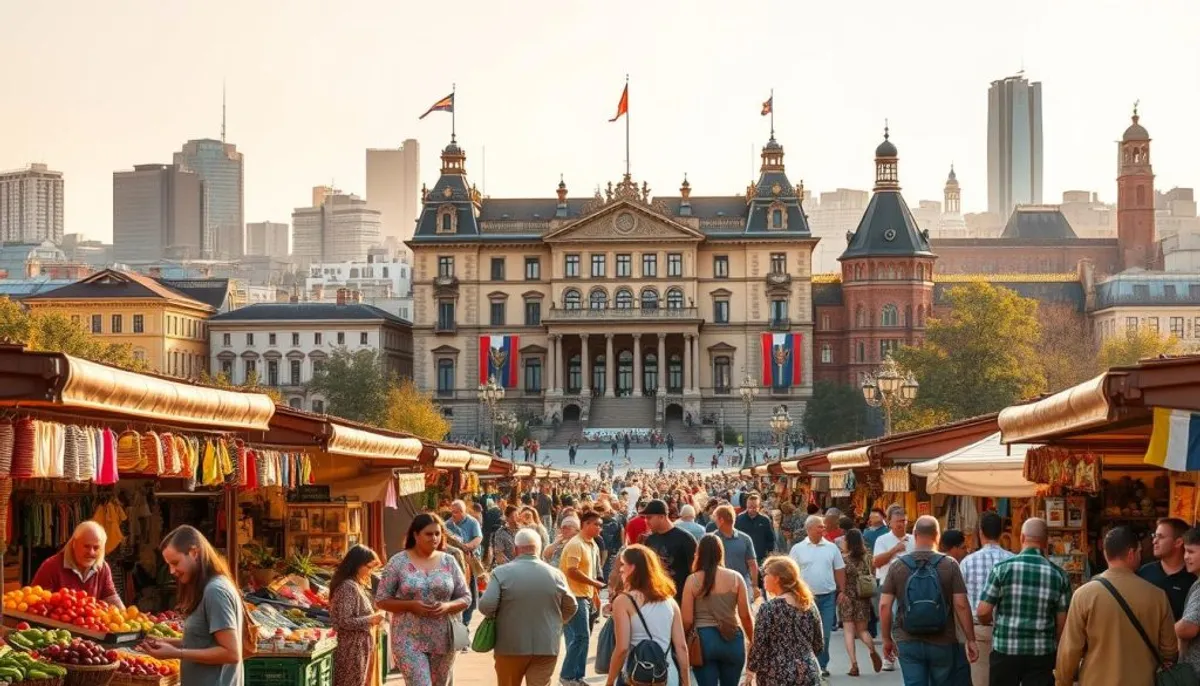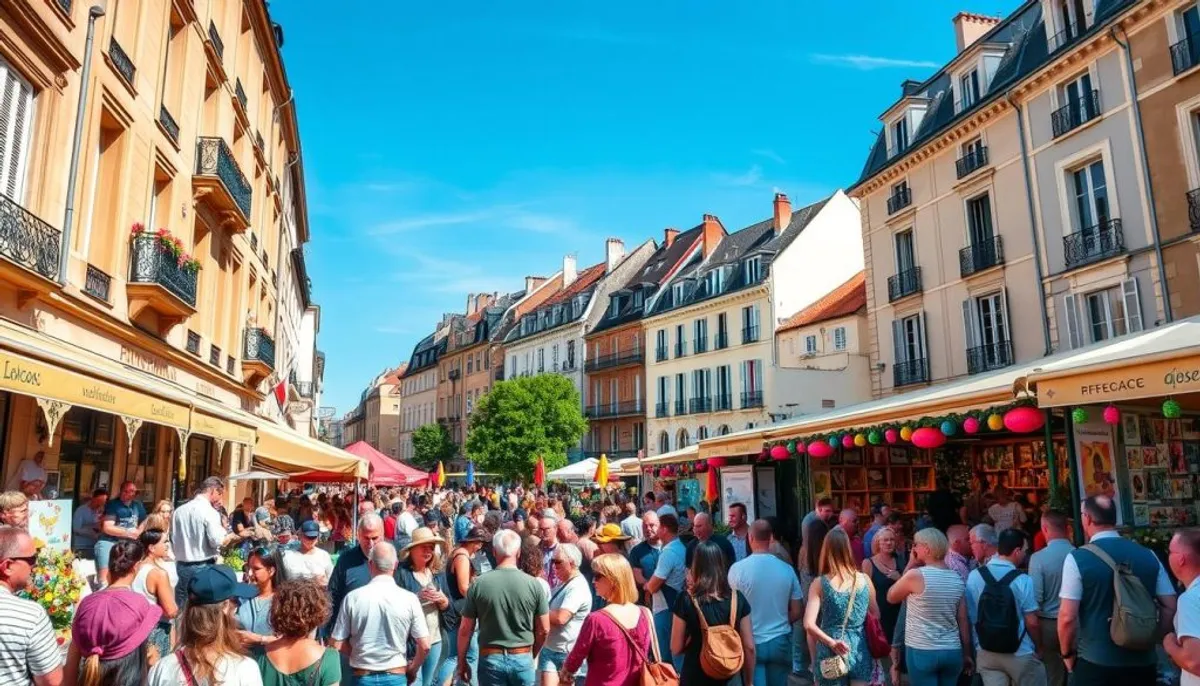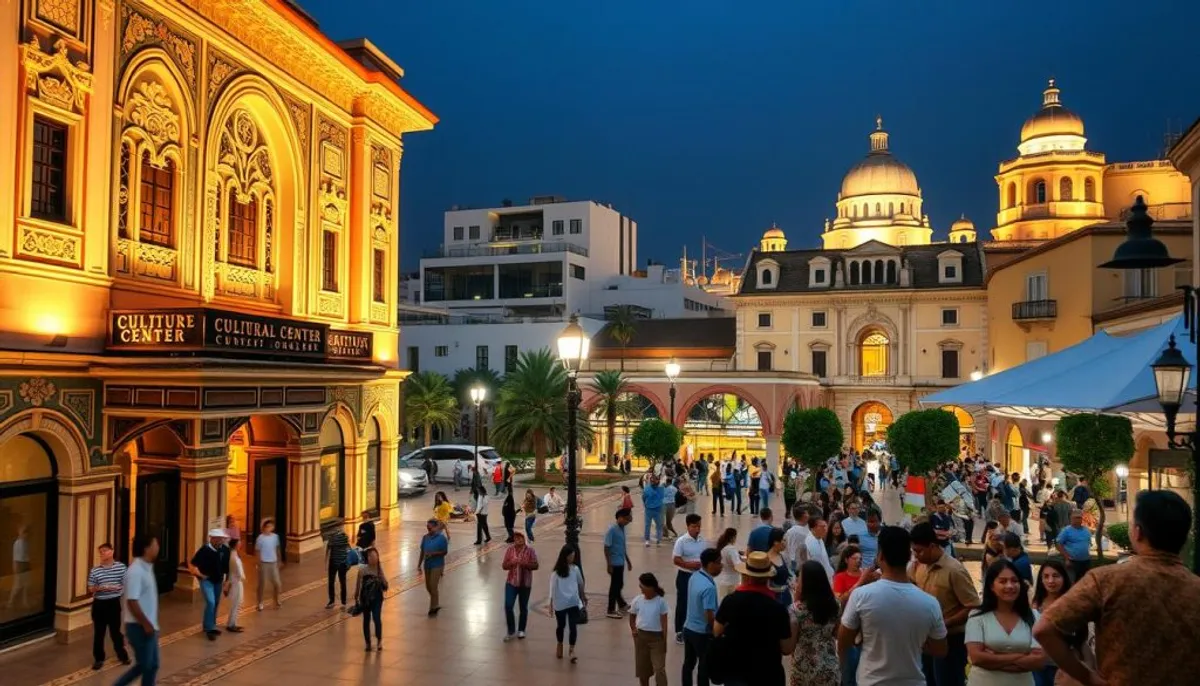France is distinguished by a rich and varied culture. Cultural interest centers offer a range of unique experiences. From museums to contemporary art spaces, these places attract over a million visitors annually.
For 40 years, art centers have shaped the French cultural landscape. They play an essential role in promoting emerging talents. They allow numerous works to be integrated into prestigious collections.

The label “Contemporary Art Center of National Interest” highlights the importance of these places. It honors their dedication to visual arts. These innovative spaces offer exhibitions, experiments, and diverse creations.
Cultural tourism, which is on the rise, enhances France's appeal. It supports the local economy and protects our heritage. From fortified castles to unique farms, each visit offers a unique experience.
Understanding the Importance of Cultural Interest Centers in France
Cultural interest centers are crucial in French society. They help preserve the cultural heritage and organize various cultural events. These places promote exchange and personal and collective development.
The Role of Cultural Centers in French Society
In France, cultural centers are foundational to social and artistic life. They provide spaces for discovery and learning, open to all ages. Each year, over a million visitors pass through, demonstrating their importance and influence.
Impact on Personal and Collective Development
Participating in cultural activities fosters individual growth and strengthens social ties. Contemporary art centers, for example, encourage creativity and dialogue between artists and the public. This interaction enriches perspectives and contributes to social evolution.
The Democratization of Access to Culture
Cultural democratization is evident in the presence of cultural centers throughout the territory. With 26 opera houses outside of Paris and 4 in the capital, the cultural offering is diverse and accessible. Public funding is essential to this approach.
| Type of Establishment | Average State Funding Rate |
|---|---|
| National opera houses in the region | 20% |
| National interest lyric theaters (TLIN) | 15% |
| National interest designated stages (SCIN) | 5% |
This distribution of funding shows the state's commitment to promoting cultural heritage. Cultural interest centers in France play an essential role in enriching the social and artistic life of the country.
The Different Types of Cultural Interest Centers
France is distinguished by an unparalleled cultural richness. Theater, literature, dance, and music play a central role. These fields are essential for individual and collective flourishing, profoundly influencing the country's cultural identity.
Theater, a millennia-old tradition, continues to captivate the French audience. It encourages oral expression, self-confidence, and creativity. Literature, on the other hand, enriches the imagination and sharpens critical thinking. It constitutes a fundamental pillar of French culture, with 65% of recruiters valuing reading as an area of interest.
Dance, whether classical or contemporary, merges physical expression and art. It illustrates qualities such as rigor and perseverance. Music, in all its forms, holds a prominent place. Playing an instrument is particularly valued, with 55% of recruiters considering it a sign of precision and discipline.
Employers recognize the importance of these cultural activities. Indeed, 80% of them believe that associative activities enrich a CV. Candidates who have engaged in an artistic activity see their chances of being hired increase by 25%.
| Cultural Interest | Skills Developed | Impact on Recruitment |
|---|---|---|
| Theater | Oral expression, self-confidence | +30% chance during interviews |
| Literature | Critical thinking, general knowledge | Appreciated by 65% of recruiters |
| Dance | Discipline, physical expression | Demonstrates rigor and perseverance |
| Music | Precision, concentration | Valued by 55% of recruiters |
The Network of Contemporary Art Centers in France
France is rich in a network of contemporary art centers, hubs of creativity and cultural innovation. These places are essential for preserving and revitalizing French artistic traditions.
National Interest Labeled Centers
The “national interest” label honors the most remarkable contemporary art centers. This official distinction underscores their crucial role in the French cultural landscape. It also ensures financial support for their activities. These centers are major cultural points of interest, attracting artists and visitors from around the world.
The Geographic Distribution of Art Centers
Contemporary art centers are spread across the entire French territory. They ensure equitable access to modern art for all citizens. Here is an overview of their distribution:
| Region | Number of Centers |
|---|---|
| Île-de-France | 6 |
| Grand Est | 6 |
| Nouvelle Aquitaine | 6 |
| Occitanie | 5 |
| Brittany | 4 |
The Main Missions of Art Centers
Contemporary art centers have several essential missions:
- Promotion of emerging artists
- Artistic and cultural education
- Preservation of contemporary cultural heritage
- Support for artistic creation
These dynamic spaces contribute to keeping artistic traditions alive while encouraging innovation. They welcome nearly 1.6 million visitors each year, including 200,000 schoolchildren. This reflects their central role in the dissemination of contemporary culture in France.
Engagement in Cultural Activities
Participating in cultural events offers numerous benefits for personal and social development. This active involvement enriches our experience and strengthens our connection to cultural heritage.
The Benefits of Cultural Participation
Engaging in cultural activities improves our mental well-being and broadens our perspectives. The Parcoursup platform values these experiences, allowing candidates to detail their cultural interests in a dedicated section of 1500 characters.

Opportunities for Personal Development
Cultural activities offer unique opportunities to acquire new skills. For example, volunteering in a cultural association for a year can demonstrate significant commitment and develop qualities valued by recruiters.
Social Integration Through Culture
Culture plays a crucial role in social integration. Cultural events create meeting spaces and promote intercultural dialogue. Participation in these activities is valued in admission files, reflecting their importance for personal and collective development.
| Type of Cultural Activity | Benefits | Valuation on Parcoursup |
|---|---|---|
| Volunteering in a cultural association | Development of social skills | Strong, up to 1500 characters |
| Participation in cultural events | Open-mindedness, curiosity | Medium, to include in experiences |
| Amateur artistic practice | Creativity, perseverance | High, in the “Openness to the World” section |
Cultural Labels and Distinctions in France
France, with its deep artistic and cultural heritage, has established a system of labels. These aim to promote its cultural treasures. They highlight the excellence and diversity of cultural interest centers across the country.
The “100% Artistic and Cultural Education” label honors communities engaged in access to culture for young people. It emphasizes the importance of artistic education from an early age.
Museums, essential to French culture, benefit from specific recognitions. In 2022, 1,216 officially recognized museums were counted. However, the total number of establishments exceeds 6,000. The 2002 museum law introduced a legal definition of “museums of France,” ensuring quality standards.
Other labels promote local heritage:
- “City and Country of Art and History” (created in 1985)
- “Grand Site of France” (established in 2010)
- “Heritage of Regional Interest” (introduced in 2016)
The performing arts are not left out. France has 19 National Choreographic Centers, 38 National Dramatic Centers, and 77 National Scenes. These labels ensure a cultural network across the entire territory. They provide access to art and culture for all.
These cultural distinctions stimulate artistic innovation and preserve the rich French heritage. They encourage the discovery and appreciation of the multiple facets of our culture. From museums to performing arts, they offer a rich and varied cultural experience.
The Valuation of Cultural Interest Centers in Professional Pathways
Cultural interest centers are essential for personal and professional development. Mentioning these centers on a CV can greatly enrich your application. They reveal unique aspects of your personality.
The Impact on CV and Career
Incorporating your passions for theater or literature into your CV can set you apart. 78% of recruiters value educated and curious candidates. These activities demonstrate your open-mindedness and creativity, qualities highly sought after in the workplace.

The Skills Developed Through Cultural Practice
Engaging in cultural activities, such as theater, develops essential skills. It enhances communication, stress management, and teamwork. These skills, acquired outside the professional framework, are a major asset for your career.
The Integration of Cultural Activities in the Workplace
More and more companies value cultural interest centers. They encourage their employees to participate in artistic activities to stimulate creativity and innovation. This trend highlights the importance of cultivating your passions, whether related to literature, theater, or other forms of cultural expression.
Do not hesitate to highlight your cultural interests. They can enrich your professional profile while fostering your personal growth at work.
Conclusion
Cultural interest centers are essential in our society. They enrich our lives and shape our identity. In France, these passions transcend mere leisure, becoming personal and professional assets.
Statistics demonstrate their importance: 80% of recruiters consider interests as a topic of discussion in interviews. Moreover, 55% seek balanced candidates capable of reconciling professional and personal life. Culture, in all its forms, develops highly valued skills in the job market.
Practicing dance, learning an instrument, or engaging in a cultural center opens up perspectives. These activities stimulate our creativity, strengthen our social ties, and promote our flourishing. They reflect a dynamic, open, and diverse French society.
Therefore, explore these cultural interest centers. They offer not only pleasure but also a springboard for your personal and professional growth. Culture is an accessible treasure, and it is time to fully appreciate it!
RelatedRelated articles


